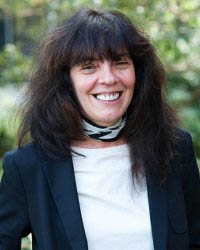Computing and Information Science receives $10M grant

The National Science Foundation (NSF) Jan. 7 announced a new $10 million award to Carla Gomes, professor of computer science and director of Cornell’s Institute for Computational Sustainability.
Gomes leads one of three Expeditions in Computing projects, each of which has been awarded $10 million over five years by NSF. The grants support interdisciplinary, multi-investigator research teams working on transformative computing and technology. It represents some of NSF’s largest investments in computer science research.
Gomes’ project will cultivate a large national and international research network called CompSustNet that will explore new research directions in computational sustainability. With Cornell as the lead, CompSustNet will partner with 11 U.S. academic institutions as well as with key organizations in the areas of conservation, poverty mitigation and renewable energy. Other Cornell faculty leads on the project include Bart Selman and John Hopcroft, Department of Computer Science; David Shmoys, School of Operations Research and Information Engineering; Jon Conrad, Dyson School of Applied Economics and Management; and Angela Fuller, Department of Natural Resources. The CompSustNet team includes many other Cornell researchers as well as international computational sustainability scholars.
“We will launch CompSustNet, a transformative computational sustainability network, bringing together computer scientists, environmental and social scientists, biologists, physicists and material scientists to expand the nascent field of computational sustainability,” said Gomes, who also has appointments in the Department of Information Science and the Dyson School of Applied Economics and Management. “Research will focus on cross-cutting computational topics such as optimization, dynamical models, big data, machine learning and citizen science, applied to sustainability challenges.
“Advances in computational sustainability will lead, for example, to novel strategies for helping herders and farmers in Africa improve their way of life, saving endangered species, and scaling renewables up to meet 21st-century energy demand.”
Gomes also led a team that received one of the first Expeditions in Computing awards in 2008. Initial funding from NSF has led to more than $80 million in support from other agencies and organizations and helped stimulate a new field.
“Carla jumpstarted the whole field of computational sustainability with the help of her first NSF Expedition award,” said CIS Dean Greg Morrisett. “This new Expeditions in Computing grant takes things to a whole new level working with a much more diverse group of people who use advanced computational methods to tackle pressing problems for society from eco-diversity to next-generation energy storage materials.”
The two other 2015 Expeditions in Computing grants went to The Science of Deep Specification (Princeton University), which aims to eliminate software “bugs’ that can lead to security vulnerabilities, and Evolving Living Computer (Boston University), which will study what computing principles can be applied repeatedly and reliably to synthetic biology.
Problems addressed by Expeditions in Computing projects typically cannot be tackled by small teams.
“The Expeditions in Computing program enables the computing research community to pursue complex problems by supporting large project teams over a longer period of time,” said Jim Kurose, NSF’s head for Computer and Information Science and Engineering. “This allows these researchers to pursue bold, ambitious research that moves the needle for not only computer science disciplines, but often many other disciplines as well.”
Universities in CompSustNet include: Bowdoin College, California Institute of Technology, Carnegie Mellon University, Georgia Institute of Technology, Howard University, Oregon State University, Princeton University, Stanford University, University of Massachusetts-Amherst, University of Southern California and Vanderbilt University. CompSustNet will be a virtual research lab, including educational, community building and outreach activities to ensure computational sustainability becomes a self-sustaining discipline.
Media Contact
Get Cornell news delivered right to your inbox.
Subscribe